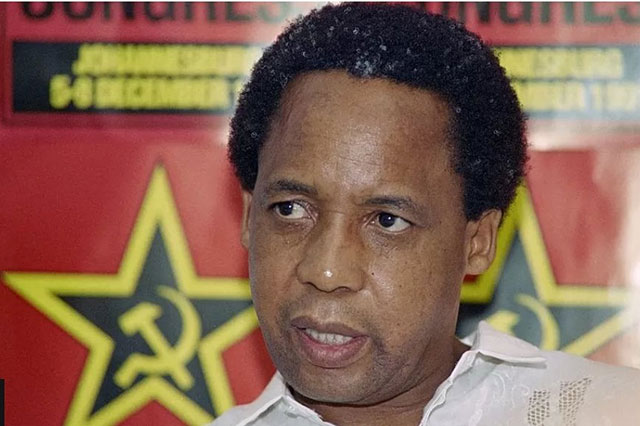Johannesburg – South Africa’s ruling party protested outside a top court Saturday after it ordered the release of a Polish immigrant whose killing of an anti-apartheid hero in 1993 almost sparked civil conflict.
The shooting of Chris Hani took the country to the brink of a race war as negotiations to end apartheid entered their final phase.
The Constitutional Court in Johannesburg on Monday ordered the release on parole of Janusz Walus, 69, who has served nearly three decades of a life sentence for the murder.
On Saturday, the ruling African National Congress (ANC) party and the South African Communist Party (SACP) — both of which have ties to Hani — led a gathering outside the court to protest the decision.
Some protestors sported T-shirts with Hani’s face on them, chanting anti-apartheid protest songs.
ALSO READ | South Africa court orders parole for anti-apartheid hero’s killer
“Obviously I am outraged,” demonstrator Lenin Mpesi told AFP.
“I don’t see why that man, Walus, needs to be released.”
“How Hani died is still undisclosed… We don’t know who paid him (Walus) and what was the reason behind it.”
Senior ANC member Panyaza Lesufi said more demonstrations were planned for his release – likely next week.
“Even when he leaves that prison… he must know South Africans are not happy,” he told local media outside the court.
“We have the right to send the message to him that you assassinated our hero. He is a murderer, and he must know that.”
READ MORE | Communist Party reacts as anti-apartheid hero’s killer gets parole
South Africa’s Chief Justice Raymond Zondo on Monday ordered the country’s correctional services minister to place Walus “on parole on such terms and conditions as he may deem appropriate”.
The right-wing gunman killed Hani, a hugely popular leader of the SACP and fierce opponent of the apartheid regime, one year before South Africa’s first multi-racial elections.
Hani was also the chief of staff of Umkhonto we Sizwe, the armed wing of the ANC.
He was shot dead in the driveway of his house on April 10, 1993, in Boksburg, a suburb east of Johannesburg. The incident led to protests and rioting in black townships.
Follow African Insider on Facebook, Twitter and Instagram
Source: AFP
Picture: Twitter/@sa_crime
For more African news, visit Africaninsider.com


